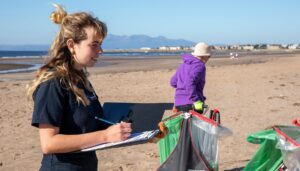Tara Proud, volunteer and community engagement manager at Marine Conservation Society, details her joy at being involved in YouthLink Scotland’s ‘On Our Wave Length’ project.

Isn’t it incredible to think that if you straightened out all of the wiggles in Scotland’s beautiful coastline it would reach all the way to Australia? It is little wonder that Scotland is world renowned for spectacular beaches, sea lochs, islands and wildlife. Did you know that more than 20 species of whales and dolphins live here? Or that the largest turtle in the world – the Leatherback Turtle – swims an incredible 10,000 miles every year to dine on jellyfish in Scottish seas?
With everything we hear about plastic pollution and climate change on social media and the news, it won’t be a surprise to anyone reading this blog when I say that Scotland’s sea life is under threat. The time for action to protect our coasts and seas is now, and as Greta Thunberg has taught us ‘No One Is Too Small to Make a Difference’.
The On Our Wave Length project, led by YouthLink Scotland, is all about empowering and supporting young people to bring about positive change for our seas, and that’s why I’m excited that we at the Marine Conservation Society are involved. The approach that the project takes – youth led research and storytelling – fits really well with the way we work as a charity, because everything we do is underpinned by science and storytelling is such an effective way of connecting with people.
The Marine Conservation Society is the UK’s leading charity for the protection of our seas, coasts and wildlife. Our approach is underpinned by evidence-based campaigning and advocating solutions which are backed by science.
For instance, for us to be successful when we’re campaigning for new laws to reduce plastic pollution in our seas we need to show political decision makers evidence of plastic pollution to influence their decisions. It is beach litter data, collected by volunteer citizen scientists, that our government is basing its decisions on. In fact, our volunteers were officially acknowledged within scientific papers published by the Scottish Government’s marine science department on marine litter just last month: this just goes to highlight how vital citizen science is.
As part of On Our Wave Length, we can support you to work with young people to explore the issues that matter most to them and their communities: whether that’s plastic pollution, climate change, sustainable seafood or something else.
Here are some ideas of the sort of research your group could carry out: